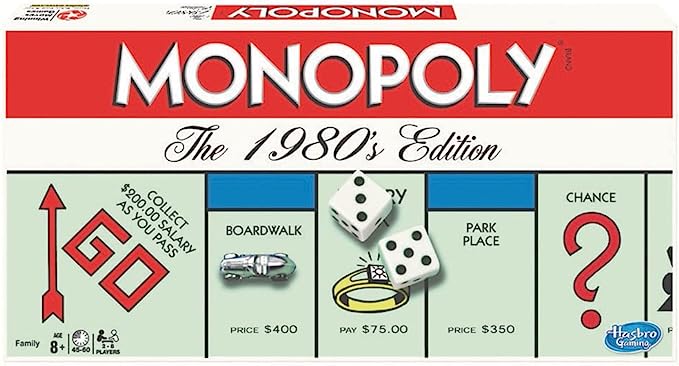The classic Monopoly board game is where players buy, sell, and trade properties to become the wealthiest player. The game board features iconic properties like Boardwalk and Park Place, and players can build houses and hotels to increase their rental income. Chance and Community Chest cards add an element of surprise, and the game can be exciting and cutthroat. Monopoly is a fun game for all ages, and it will provide hours of entertainment for family and friends.

Overview
Monopoly, the world-famous board game, has been a staple of family game nights for over 80 years. It’s a game of buying, selling, and trading properties, with the ultimate goal of being the wealthiest player when everyone else is bankrupt.
What’s Included
Gameboard: This iconic folding cardboard map features familiar squares like Boardwalk, Park Place, and Baltic Avenue, each representing a property that players can buy and trade.
Tokens: Players choose from eight classic pewter-playing pieces, such as the iron, car, top hat, and dog, to represent themselves on the board.
Title Deed Cards: Each property on the board has a corresponding Title Deed card that players collect when they purchase the property. These cards show the property’s name, color group, purchase price, and rent amounts for different development levels.
Chance and Community Chest Cards: These decks of cards add an element of surprise and excitement to the game. Players draw cards when they land on the corresponding spaces, and the instructions on the cards can range from collecting money to moving to another space on the board.
Play Money: Monopoly comes with a stack of colorful play money in various denominations, from $1 bills to $500 bills. Players use this money to buy properties, pay rent, and conduct other transactions during the game.
Houses and Hotels: As players acquire properties of the same color, they can purchase miniature houses and hotels to place on those properties. This increases the rent that other players must pay when they land on those spaces.
Dice: Two standard six-sided dice are used to determine a player’s movement around the board. Players take turns rolling the dice and moving their tokens to the corresponding number of spaces.
Banker’s Tray: This optional component can be used to hold the play money and cards, making it easier for the designated banker to keep track of the game’s finances.
Instructions: The game also includes a set of instructions that explain the rules and gameplay in detail.
In addition to these standard components, some Monopoly editions may also include other items, such as a Speed Die for faster gameplay or special themed tokens.
Pros
Simple to learn, difficult to master: The basic rules are easy to understand, making it accessible for players of all ages. However, mastering the strategic nuances of buying, selling, and trading properties can take years of practice, offering long-term replayability and depth.
High replayability: Each game unfolds differently due to the random element of dice rolls and property draws, keeping it fresh and exciting even after numerous playthroughs.
Promotes social interaction: Monopoly is a social game that encourages negotiation, deal-making, and friendly competition. It can be a great way to connect with friends and family, creating shared memories and laughter.
Educational value: While primarily a game of chance, Monopoly can teach players basic economic principles like buying low, selling high, and the importance of investing. It can also spark conversations about real-world financial concepts like property ownership, mortgages, and scarcity.
Nostalgia factor: For many people, Monopoly evokes childhood memories of family game nights and friendly rivalries. This nostalgic element can add to the enjoyment of the game, especially for older players.
Cons
Can be long and drawn out:
Games can last for several hours, especially with inexperienced players or those prone to lengthy negotiations. This can lead to boredom and frustration, particularly for players who are eliminated early.
Luck-based:
The outcome of the game can be heavily influenced by luck. With dice rolls and property draws sometimes creating unfair advantages for certain players. This can be frustrating for those who feel they were unlucky, even if they played strategically.
Monopoly money can be confusing:
The large denominations and fake currency can be confusing for younger players, especially when making calculations and trades. This can slow down the game and add to frustration.
Can be cutthroat and competitive:
While some enjoy the competitive nature, Monopoly can bring out the worst in some players. Leading to arguments, hurt feelings, and accusations of cheating. This can ruin the fun for everyone involved.
Limited strategic depth:
While there are some strategic elements, Monopoly is ultimately a game of chance with limited room for true strategic maneuvering. This can be unsatisfying for players who prefer games with more complex decision-making.
Overall Review
Classic charm + cutthroat deals = Monopolistic mayhem! Fun, fast, and sometimes frustrating, Monopoly reigns as a family game night (and potential family feud) staple. Just remember, friendships can be bought, but not always repurchased.